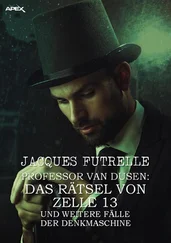Jacques Futrelle - The Problem of Cell 13
Здесь есть возможность читать онлайн «Jacques Futrelle - The Problem of Cell 13» весь текст электронной книги совершенно бесплатно (целиком полную версию без сокращений). В некоторых случаях можно слушать аудио, скачать через торрент в формате fb2 и присутствует краткое содержание. Жанр: Детектив, на английском языке. Описание произведения, (предисловие) а так же отзывы посетителей доступны на портале библиотеки ЛибКат.
- Название:The Problem of Cell 13
- Автор:
- Жанр:
- Год:неизвестен
- ISBN:нет данных
- Рейтинг книги:4 / 5. Голосов: 1
-
Избранное:Добавить в избранное
- Отзывы:
-
Ваша оценка:
- 80
- 1
- 2
- 3
- 4
- 5
The Problem of Cell 13: краткое содержание, описание и аннотация
Предлагаем к чтению аннотацию, описание, краткое содержание или предисловие (зависит от того, что написал сам автор книги «The Problem of Cell 13»). Если вы не нашли необходимую информацию о книге — напишите в комментариях, мы постараемся отыскать её.
The Problem of Cell 13 — читать онлайн бесплатно полную книгу (весь текст) целиком
Ниже представлен текст книги, разбитый по страницам. Система сохранения места последней прочитанной страницы, позволяет с удобством читать онлайн бесплатно книгу «The Problem of Cell 13», без необходимости каждый раз заново искать на чём Вы остановились. Поставьте закладку, и сможете в любой момент перейти на страницу, на которой закончили чтение.
Интервал:
Закладка:
The Problem of Cell 13
by Jacques Futrelle
I
Practically all those letters remaining in the alphabet after Augustus S. F. X. Van Dusen was named were afterward acquired by that gentleman in the course of a brilliant scientific career, and, being honorably acquired, were tacked on to the other end. His name, therefore, taken with all that belonged to it, was a wonderfully imposing structure. He was a Ph.D., an LL.D., an F.R.S., an M.D., and an M.D.S. He was also some other things — just what he himself couldn't say — through recognition of his ability by various foreign educational and scientific institutions.
In appearance he was no less striking than in nomenclature. He was slender with the droop of the student in his thin shoulders and the pallor of a close, sedentary life on his clean-shaven face. His eyes wore a perpetual, forbidding squint — the squint of a man who studies little things — and when they could be seen at all through his thick spectacles, were mere slits of watery blue. But above his eyes was his most striking feature. This was a tall, broad brow, almost abnormal in height and width, crowned by a heavy shock of bushy, yellow hair. All these things conspired to give him a peculiar, almost grotesque, personality.
Professor Van Dusen was remotely German. For generations his ancestors had been noted in the sciences; he was the logical result, the master mind. First and above all he was a logician. At least thirty-five years of the half-century or so of his existence had been devoted exclusively to proving that two and two always equal four, except in unusual cases, where they equal three or five, as the case may be. He stood broadly on the general proposition that all things that start must go somewhere, and was able to bring the concentrated mental force of his forefathers to bear on a given problem. Incidentally it may be remarked that Professor Van Dusen wore a No. 8 hat.
The world at large had heard vaguely of Professor Van Dusen as the Thinking Machine. It was a newspaper catch-phrase applied to him at the time of a remarkable exhibition at chess; he had demonstrated then that a stranger to the game might, by the force of inevitable logic, defeat a champion who had devoted a lifetime to its study. The Thinking Machine! Perhaps that more nearly described him than all his honorary initials, for he spent week after week, month after month, in the seclusion of his small laboratory from which had gone forth thoughts that staggered scientific associates and deeply stirred the world at large.
It was only occasionally that The Thinking Machine had visitors, and these were usually men who, themselves high in the sciences, dropped in to argue a point and perhaps convince themselves. Two of these men, Dr. Charles Ransome and Alfred Fielding, called one evening to discuss some theory which is not of consequence here.
"Such a thing is impossible," declared Dr. Ransome emphatically, in the course of the conversation.
"Nothing is impossible," declared The Thinking Machine with equal emphasis. He always spoke petulantly. "The mind is master of all things. When science fully recognizes that fact a great advance will have been made."
"How about the airship?" asked Dr. Ransome.
"That's not impossible at all," asserted The Thinking Machine. "It will be invented some time. I'd do it myself, but I'm busy."
Dr. Ransome laughed tolerantly.
"I've heard you say such things before," he said." But they mean nothing. Mind may be master of matter, but it hasn't yet found a way to apply itself. There are some things that can't be thought out of existence, or rather which would not yield to any amount of thinking."
"What, for instance?" demanded The Thinking Machine.
Dr. Ransome was thoughtful for a moment as he smoked.
"Well, say prison walls," he replied. "No man can think himself out of a cell. If he could, there would be no prisoners."
"A man can so apply his brain and ingenuity that he can leave a cell, which is the same thing," snapped The Thinking Machine.
Dr. Ransome was slightly amused.
"'Let's suppose a case," he said, after a moment. "Take a cell where prisoners under sentence of death are confined — men who are desperate and, maddened by fear, would take any chance to escape — suppose you were locked in such a cell. Could you escape?"
"Certainly," declared The Thinking Machine.
"Of course," said Mr. Fielding, who entered the conversation for the first time, "you might wreck the cell with an explosive — but inside, a prisoner, you couldn't have that."
"There would be nothing of that kind," said The Thinking Machine. "You might treat me precisely as you treated prisoners under sentence of death, and I would leave the cell."
"Not unless you entered it with tools prepared to get out," said Dr. Ransome.
The Thinking Machine was visibly annoyed and his blue eyes snapped.
"Lock me in any cell in any prison anywhere at any time, wearing only what is necessary, and I'll escape in a week," he declared, sharply.
Dr. Ransome sat up straight in the chair, interested. Mr. Fielding lighted a new cigar.
"You mean you could actually think yourself out?" asked Dr. Ransome.
"I would get out," was the response.
"Are you serious?"
"Certainly I am serious."
Dr. Ransome and Mr. Fielding were silent for a long time.
"Would you be willing to try it?" asked Mr. Fielding, finally.
"Certainly," said Professor Van Dusen, and there was a trace of irony in his voice. "I have done more asinine things than that to convince other men of less important truths."
The tone was offensive and there was an undercurrent strongly resembling anger on both sides. Of course it was an absurd thing, but Professor Van Dusen reiterated his willingness to undertake the escape and it was decided upon.
"To begin now," added Dr. Ransome.
"I'd prefer that it begin to-morrow," said The Thinking Machine, "because — "
"No, now," said Mr. Fielding, flatly. "You are arrested, figuratively, of course, without any warning locked in a cell with no chance to communicate with friends, and left there with identically the same care and attention that would be given to a man under sentence of death. Are you willing?"
"All right, now, then," said the Thinking Machine, and he arose.
"Say, the death-cell in Chisholm Prison."
"The death-cell in Chisholm Prison."
"And what will you wear?"
"As little as possible," said The Thinking Machine. "Shoes, stockings, trousers and a shirt."
"You will permit yourself to be searched, of course?"
'I am to be treated precisely as all prisoners are treated," said The Thinking Machine. "No more attention and no less."
There were some preliminaries to be arranged in the matter of obtaining permission for the test, but all three were influential men and everything was done satisfactorily by telephone, albeit the prison commissioners, to whom the experiment was explained on purely scientific grounds, were sadly bewildered. Professor Van Dusen would be the most distinguished prisoner they had ever entertained.
When The Thinking Machine had donned those things which he was to wear during his incarceration he called the little old woman who was his housekeeper, cook and maid servant all in one.
"Martha," he said, "it is now twenty-seven minutes past nine o'clock. I am going away. One week from to-night, at half-past nine, these gentlemen and one, possibly two, others will take supper with me here. Remember Dr. Ransome is very fond of artichokes."
The three men were driven to Chisholm Prison, where the Warden was awaiting them, having been informed of the matter by telephone. He understood merely that the eminent Professor Van Dusen was to be his prisoner, if he could keep him, for one week; that he had committed no crime, but that he was to be treated as all other prisoners were treated.
Читать дальшеИнтервал:
Закладка:
Похожие книги на «The Problem of Cell 13»
Представляем Вашему вниманию похожие книги на «The Problem of Cell 13» списком для выбора. Мы отобрали схожую по названию и смыслу литературу в надежде предоставить читателям больше вариантов отыскать новые, интересные, ещё непрочитанные произведения.
Обсуждение, отзывы о книге «The Problem of Cell 13» и просто собственные мнения читателей. Оставьте ваши комментарии, напишите, что Вы думаете о произведении, его смысле или главных героях. Укажите что конкретно понравилось, а что нет, и почему Вы так считаете.




![Brian Jacques - Martin the Warrior [Redwall 6]](/books/128385/brian-jacques-martin-the-warrior-redwall-6-thumb.webp)







